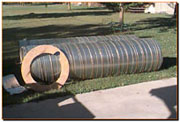CDA Backs DX Geothermal Heat Pump R&D
Copper Applications in Health & Environment
Studies aim to save energy, reduce home heating/cooling costs by more than 60% while lowering release of CO 2 and other harmful gases.
The Copper Development Association is sponsoring research designed to gain a better understanding of direct exchange ground coupled heat pumps (DX/GCHP). The research, which has been underway for more than a year, is being conducted by Prof. W. Stanley Johnson of the University of Tennessee at Knoxville. Prof. Johnson is testing heat pump systems under operating conditions that duplicate those found in actual home heating/cooling situations.
The principal goal of CDA's research program is to develop the information needed to help make DX/GCHP systems a commercial success. This means studying the systems under carefully monitored conditions, making technical improvements wherever possible, and finally, presenting the data obtained in ways that other engineers, designers - and consumers - can use. Along those lines, the U. of Tennessee researchers are currently developing software to enable homeowners to predict the cost savings they would realize by installing a DX/GCHP system.
 |
 |
 |
 |
What are Direct Exchange Ground Coupled Heat Pumps?
Heat pumps heat and cool your home by exchanging ("pumping") heat energy between the house's interior and an external energy reservoir such as the atmosphere, a body of water or the ground. Heat pumps have been used to heat and cool homes and buildings for more than 40 years. Today, about one of every three new homes is heated and cooled by a heat pump system.
Ground coupled, or geothermal heat pumps use the Earth itself as an energy reservoir. Direct exchange (DX) ground coupled heat pumps are unique in that they use a single recirculating working fluid and a single heat exchanger to transfer energy directly between the home and the external reservoir. In such systems, heat is efficiently transferred to and from the ground through a series of buried copper tubes.
Why Should You Consider a DX/GCHP System?
First, because a DX/GCHP system can save you serious money.
DX/GCHP systems represent the state of the art in home heating/cooling technology. According to a consortium backed by the US Environmental Protection Agency (EPA), high-efficiency geothermal heat pumps are the most efficient, least costly and most environmentally friendly way to heat and cool your home. On average, they are 48% more efficient than the best gas furnaces and more than 75% more efficient than oil furnaces 1 .
Consider this: If you have an average-sized house with about 2000 square feet of living space, and if you heat and cool it with a conventional oil, gas or electric system, you are probably paying about $2500 a year including the cost of hot water. You could reduce that cost to $1000 a year or less by installing a DX/GCHP system.
Second, because widespread use of DX/GCHP systems will reduce our national energy consumption.
About 19% of America's total energy consumption is used for home heating and cooling. Another 16% is used to heat and cool commercial buildings. That's a total of more than 30 quads of energy, or about the amount of energy contained in 14 million barrels of imported oil per day over an entire year. If every U.S. home and commercial building were equipped with a DX/GC heat pump, we'd save about as much oil as the U.S. imported in 1994 2 . That's not a realistic goal, or course, but it does give an idea of the amount of energy involved.
And finally, because DX/GCHP systems benefit the environment.
Installing energy-efficient DX/GCHP systems is one important means by which we can maintain a clean environment. Heating and cooling U.S. homes and commercial buildings accounts for about 26% of the nation's carbon dioxide emissions - plus other potentially harmful gases such as NOx and methane. The more efficiently we consume energy, the lower will be the emission of those gases—it's that simple.
Also in this Issue:
- Electric Vehicles
- New Research Program Focuses on Improvements for the 21st Century
- A Discussion of Future Trends and Their Influences on the Copper Strip, Sheet and Plate Industry Part 2 of 2
- A Discussion of Future Trends and Their Influences on the Copper Strip, Sheet and Plate Industry Part 1 of 2
- Copper Motor Rotors: Application of High Temperature Mold Materials to Die Cast the Copper Motor
- CDA Backs DX Geothermal Heat Pump R&D
